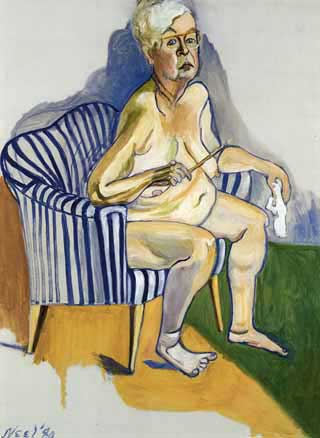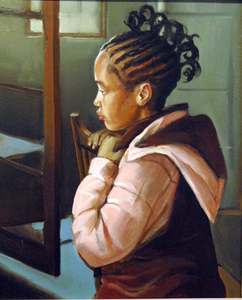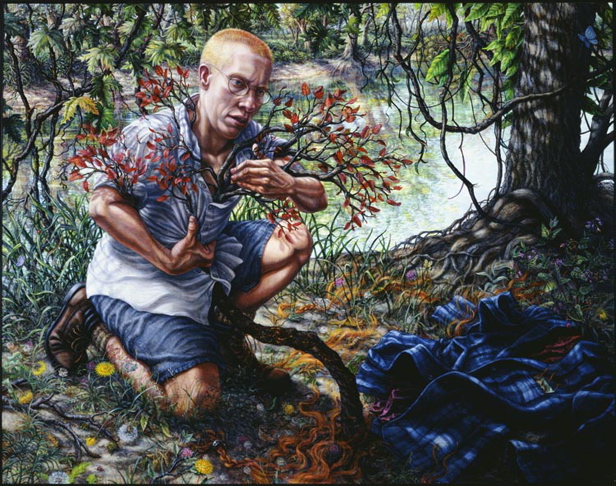May 5, 2014 - 18:25

Identity Matters:
Being, Belonging, Becoming.
A 360°cluster offered in Fall 2014.
Anne Dalke (Bryn Mawr English), Kristin Lindgren (Haverford Writing Program),
and Sara Bressi (Bryn Mawr Graduate School of Social Work and Social Research)
|  |  |  |
Riva Lehrer's Portrait of Eli Clare, Alice Neel's Self Portrait, Nancy Bea Miller's Amber Dreaming, and Guo Ixo's Early Spring
“.. .gender reaches into disability; disability wraps around class; class strains against abuse; abuse snarls into sexuality; sexuality folds on top of race. . . everything finally piling into a single human body" (Eli Clare, Exile and Pride).
"Individuality emerges in the context of an object's surroundings; and identity depends upon the object's relationships with others. Once those relationships change, the object assumes a new identity…less a matter of unchanging essence than it is a matter of playing a particular role" (Stanley Murashige, Rhythm, Order, Change and Nature in Guo Ixo's Early Spring).
“…the ultimate connection must be the need we find between us…what we can do for each other.…it was not who they were but what they both know and what they were both preparing to do about what they know that was going to make them both free at last…” (June Jordan, “Report from the Bahamas").
This cluster of courses, which have been co-designed by professors with shared interests in disability studies, gender studies, human development, literature, social work, visual studies and writing, considers how multiple systems of identity, as Rosemarie Garland-Thomson says, “intertwine, redefine, and mutually constitute one another.” Focusing, in particular, on those identity categories of “humans being” that may seem non-normative, we are reading, viewing and creating a range of self-representations: What stories do we tell about ourselves? What images do we construct? How might we revise them? To what degree can we—and do we want to--intervene in the processes of gender and sexual identity, illness, disability and aging? What changes and “cures” are desirable? What are the possibilities, and what are the limits, of our re-imagining ourselves? What roles might others play in this re-imagining?
Courses:
- ENGL 293: Critical Feminist Studies. Anne Dalke, English and Gender Studies. English House Lecture Hall, Bryn Mawr. Tuesdays/Thursdays. 2:25-3:45. Not monolithic, prescriptive, conformist or singular, contemporary feminist theory covers a wide range of perspectives and approaches, which this class will showcase. We will pay particular attention to questions of intersectionality. Reading and interpreting literary texts, we will also be attending to broader theoretical and political concerns, in an attempt to define the questions which contemporary feminisms raise, the different answers with which feminisms reply, and the multiple possibilities that exist for transformation.
- ICPR 207: Disability, Identity, Culture. Kristin Lindgren, Haverford Writing Program. Stokes 207, Haverford. Mondays/Wednesdays, 2:30-4. Exploring representations of illness and disability in literature, culture, and visual art, we will examine how these representations put pressure on theories of identity, identity studies, and post-identity politics. Through our reading of theory, memoir, and fiction and viewing of portraits and documentary films, we will ask: Who gets to tell stories and create images representing disabled bodies and minds, and what ethical conundrums are involved in this work of storytelling and image-making? How do embodied identities of race, gender and sexuality, class, age, and ability intersect and collide?
- SOWK 556: Adult Development and Aging. Sara Bressi, Graduate School of Social Work and Social Research. Room G-4, basement of the School of Social Work, Tuesdays, 11-1:20. Aging is the systematic and planned breakdown of a living system. It also clearly marks an evolution in our sense of our own identities. With a particular focus on middle age and late adulthood, and a particular interest in the genre of self-representation that is the memoir, this course will ask how we are defined culturally, socially, psychologically, and biologically by age. We will explore developmental processes in adulthood, and the strengths and vulnerabilities of adults and older adults, as well as the political, social, and academic discourse around the concept of aging successfully in the 21st century. Looking at how the experience of growing older intersects with the identity politics of race, ethnicity, gender, class, disability, culture, and sexual orientation, we will direct our attention to individuals, families, communities, organizations, and society at large.
Field components: A creative residency with Riva Lehrer, and a workshop and performance with Monsoon Bissell '93 and Benaifer Bhadha. Four day praxis experience at Camphill Village/Kimberton Hills (an intentional community in Chester County that includes adults with developmental disabilities, who engage in farming, gardening, and the making of handicrafts); three local field trips: to view some portraits in Center City museums; to visit the Mutter Musuem, and also a facility for the elderly (perhaps the Center for Positive Aging, in Ardmore; the John C. Anderson Apartments, An LGBT-Friendly Community in Center City; or Center in the Park, a non-profit community center in Northwest Philadelphia).
To be considered for this 360°, students must have preregistered and submitted a questionnaire.

